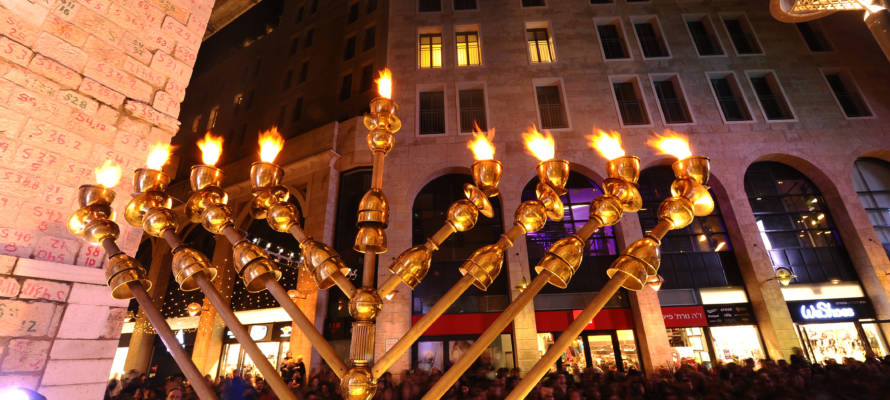What justifies reciting the blessings on the menora at public lighting ceremonies?
By Rabbi Ari Enkin, Rabbinic Director, United with Israel
The Chabad Lubavitch public menora lighting ceremonies are a familiar feature of the organization’s worldwide outreach activities. These annual events are extremely valuable, as they serve to awaken Jewish pride and offer the Chanukah experience to those who might not otherwise observe the holiday in any way.
In addition to the speeches, concerts, and free sufganiot, the central feature of these events is, of course, the actual lighting of the menora. It is not completely clear, however, whether the practice of reciting the accompanying blessings when lighting the menora at these events is actually permitted.
The reason for this uncertainty is because all the classical texts rule that one may only recite the blessings when lighting a menora in the home or the synagogue. Indeed, it has been noted that, while the Lubavitcher Rebbe certainly encouraged these public Chanukah menora lightings, he actually never commented as to whether or not the accompanying blessings should be recited. No one is quite sure why he was silent on this issue, though the speculation is plentiful.
As a matter of fact, even the current practice of reciting the blessings when lighting the menora in the synagogue is not without its detractors. This is because there is no source in the Talmud or early codes that authorizes doing so. Indeed, there have been many authorities in the past who opposed the custom of lighting the menora in the synagogue.
Even in more recent times there were great rabbis who would decline the “honor” of lighting the menora in the synagogue for this reason. According to this approach, congregations that insist on lighting the menora each night should do so without reciting the accompanying blessings. Nevertheless, normative law is not in accordance with this view, and the menora is lit in synagogues each night of Chanukah along with its accompanying blessings.
Our sages actually had to go to great lengths in order to justify the lighting of the menora in the synagogue. Some authorities defended the practice by arguing that lighting the menora in the synagogue accomplishes the mitzva of “pirsumei nisa”, publicizing the miracles of Chanukah. Other authorities explain that the menora is lit in the synagogue on behalf of those who are unable to light a menora themselves. Even so, the authorities are quick to assert that the dispensation to recite the blessings on the menora in the synagogue does not extend to any other venue.
Nevertheless, there may be grounds to justify reciting the blessings at these public menora lightings based on other considerations.
There is a precedent cited in the literature that allows for study groups who meet nightly during Chanukah to light the menora along with the accompanying blessings. It is also noted that the original institution and intention of the menora lighting at home was for it to take place outdoors, a practice that is uncommon in most of the world today. As such, it is argued that the recitation of the blessings at these public menora lightings is justifiable because they often include some form of Torah study, such as relating the Chanukah story. They also recall the original enactment of the sages to light the menora outdoors.
There is additional justification for reciting the blessings at these events if they include prayers, essentially turning the place into a “synagogue” at least temporarily. Similarly, one will also find that weddings that take place on Chanukah often include a menora lighting ceremony in which the accompanying blessings are recited and this practice has won the support of many contemporary authorities.
As such, reciting the blessings on the menora at these public lighting is justified accordingly.
